高中中学英语语法:英语近义词辨析
- 格式:docx
- 大小:18.43 KB
- 文档页数:6
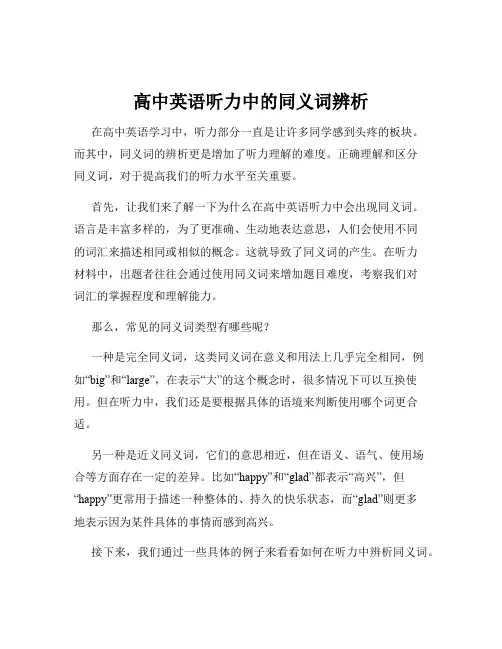
高中英语听力中的同义词辨析在高中英语学习中,听力部分一直是让许多同学感到头疼的板块。
而其中,同义词的辨析更是增加了听力理解的难度。
正确理解和区分同义词,对于提高我们的听力水平至关重要。
首先,让我们来了解一下为什么在高中英语听力中会出现同义词。
语言是丰富多样的,为了更准确、生动地表达意思,人们会使用不同的词汇来描述相同或相似的概念。
这就导致了同义词的产生。
在听力材料中,出题者往往会通过使用同义词来增加题目难度,考察我们对词汇的掌握程度和理解能力。
那么,常见的同义词类型有哪些呢?一种是完全同义词,这类同义词在意义和用法上几乎完全相同,例如“big”和“large”,在表示“大”的这个概念时,很多情况下可以互换使用。
但在听力中,我们还是要根据具体的语境来判断使用哪个词更合适。
另一种是近义同义词,它们的意思相近,但在语义、语气、使用场合等方面存在一定的差异。
比如“happy”和“glad”都表示“高兴”,但“happy”更常用于描述一种整体的、持久的快乐状态,而“glad”则更多地表示因为某件具体的事情而感到高兴。
接下来,我们通过一些具体的例子来看看如何在听力中辨析同义词。
比如,在一段听力材料中,提到“The room is spacious” 这里的“spacious”表示“宽敞的”,如果我们对“roomy”这个同义词不熟悉,就可能会理解困难。
“spacious”更强调空间的开阔和宽广,“roomy”则更侧重于有足够的空间容纳物品或人。
再比如,听到“The man is intelligent” 这里的“intelligent”意思是“聪明的”,而“clever”和“wise”也是表示“聪明”的同义词。
“clever”侧重于头脑灵活、反应快;“wise”则更强调有智慧、有判断力。
在听力中,要准确辨析同义词,我们需要注意以下几点:第一,要注重积累词汇量。
平时多背诵单词,不仅要记住单词的拼写和发音,还要了解其词义、词性和用法。
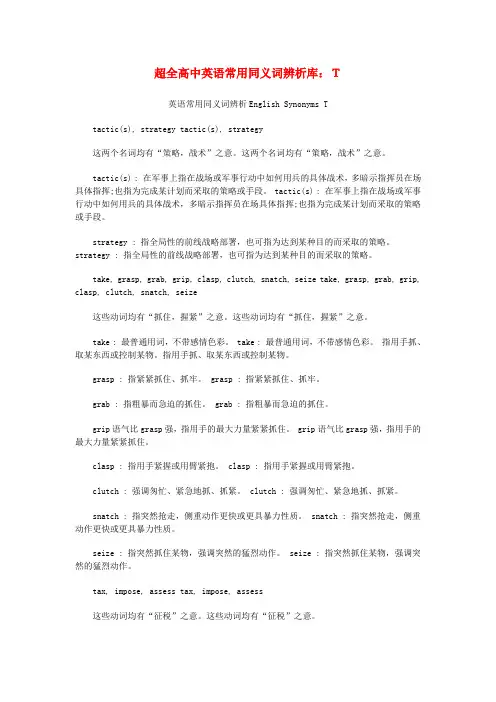
超全高中英语常用同义词辨析库:T英语常用同义词辨析English Synonyms Ttactic(s), strategy tactic(s), strategy这两个名词均有“策略,战术”之意。
这两个名词均有“策略,战术”之意。
tactic(s) : 在军事上指在战场或军事行动中如何用兵的具体战术,多暗示指挥员在场具体指挥;也指为完成某计划而采取的策略或手段。
tactic(s) : 在军事上指在战场或军事行动中如何用兵的具体战术,多暗示指挥员在场具体指挥;也指为完成某计划而采取的策略或手段。
strategy : 指全局性的前线战略部署,也可指为达到某种目的而采取的策略。
strategy : 指全局性的前线战略部署,也可指为达到某种目的而采取的策略。
take, grasp, grab, grip, clasp, clutch, snatch, seize take, grasp, grab, grip, clasp, clutch, snatch, seize这些动词均有“抓住,握紧”之意。
这些动词均有“抓住,握紧”之意。
take : 最普通用词,不带感情色彩。
take : 最普通用词,不带感情色彩。
指用手抓、取某东西或控制某物。
指用手抓、取某东西或控制某物。
grasp : 指紧紧抓住、抓牢。
grasp : 指紧紧抓住、抓牢。
grab : 指粗暴而急迫的抓住。
grab : 指粗暴而急迫的抓住。
grip语气比grasp强,指用手的最大力量紧紧抓住。
grip语气比grasp强,指用手的最大力量紧紧抓住。
clasp : 指用手紧握或用臂紧抱。
clasp : 指用手紧握或用臂紧抱。
clutch : 强调匆忙、紧急地抓、抓紧。
clutch : 强调匆忙、紧急地抓、抓紧。
snatch : 指突然抢走,侧重动作更快或更具暴力性质。
snatch : 指突然抢走,侧重动作更快或更具暴力性质。
seize : 指突然抓住某物,强调突然的猛烈动作。
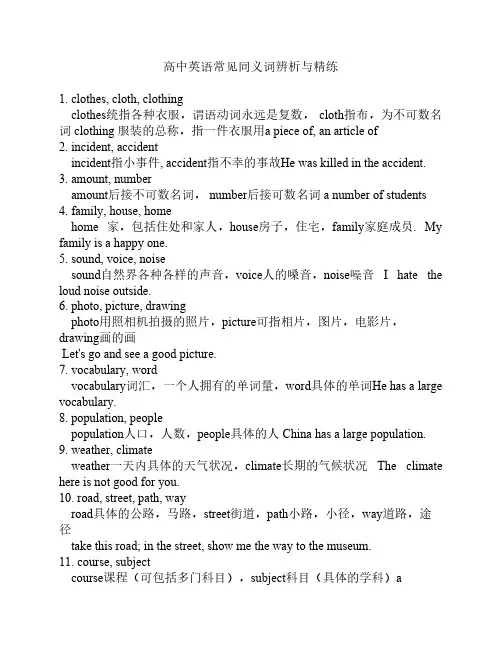
高中英语常见同义词辨析与精练1. clothes, cloth, clothing clothes统指各种衣服,谓语动词永远是复数, cloth指布,为不可数名词 clothing 服装的总称,指一件衣服用a piece of, an article of2. incident, accident incident指小事件, accident指不幸的事故He was killed in the accident. 3. amount, number amount后接不可数名词, number后接可数名词 a number of students 4. family, house, home home 家,包括住处和家人,house房子,住宅,family家庭成员. My family is a happy one.5. sound, voice, noise sound自然界各种各样的声音,voice人的嗓音,noise噪音I hate the loud noise outside.6. photo, picture, drawing photo用照相机拍摄的照片,picture可指相片,图片,电影片,drawing画的画Let's go and see a good picture.7. vocabulary, word vocabulary词汇,一个人拥有的单词量,word具体的单词He has a large vocabulary.8. population, people population人口,人数,people具体的人 China has a large population. 9. weather, climate weather一天内具体的天气状况,climate长期的气候状况The climate here is not good for you.10. road, street, path, way road具体的公路,马路,street街道,path小路,小径,way道路,途径 take this road; in the street, show me the way to the museum.11. course, subject course课程(可包括多门科目),subject科目(具体的学科)asummer course12. custom, habit custom传统风俗,习俗,也可指生活习惯,后接to do,habit生活习惯,习惯成自然,后接of doing. I've got the habit of drinking a lot.13. cause, reason cause 指造成某一事实或现象的直接原因,后接of sth./doing sth,reason用来解释某种现象或结果的理由,后接for sth./doing sth. the reason for being late14. exercise, exercises, practice exercise运动,锻炼(不可数),exercises练习(可数),practice(反复做的)练习Practice makes perfect.15. class, lesson 作"课"解时,两者可以替换.指课文用lesson. 指班级或全体学生用class. lesson 6; class 516. speech, talk, lecture speech指在公共场所所做的经过准备的较正式的演说,talk日常生活中的一般的谈话,讲话,lecture学术性的演讲,讲课 a series of lecture on…17. officer, official officer部队的军官,official政府官员 an army officer18. work, job 二者均指工作。
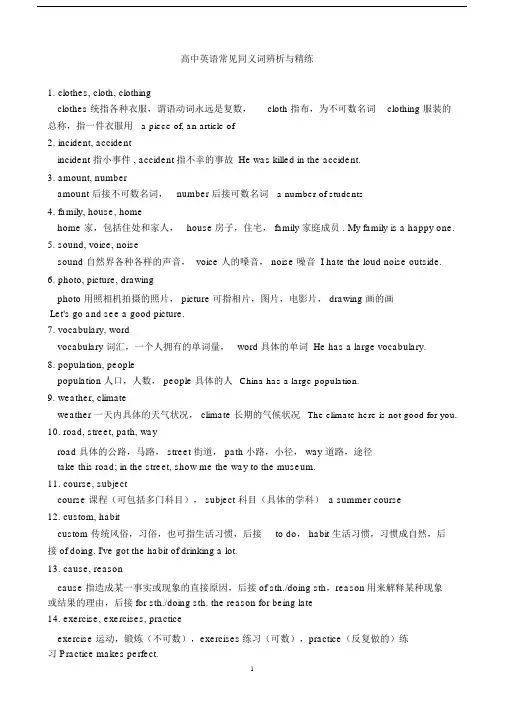
高中英语常见同义词辨析与精练1. clothes, cloth, clothingclothes 统指各种衣服,谓语动词永远是复数,cloth 指布,为不可数名词clothing 服装的总称,指一件衣服用 a piece of, an article of2. incident, accidentincident 指小事件 , accident指不幸的事故 He was killed in the accident.3. amount, numberamount 后接不可数名词,number 后接可数名词 a number of students4. family, house, homehome 家,包括住处和家人,house房子,住宅, family 家庭成员 . My family is a happy one.5. sound, voice, noisesound 自然界各种各样的声音,voice 人的嗓音, noise 噪音 I hate the loud noise outside. 6. photo, picture, drawingphoto 用照相机拍摄的照片, picture 可指相片,图片,电影片, drawing 画的画Let's go and see a good picture.7. vocabulary, wordvocabulary 词汇,一个人拥有的单词量,word 具体的单词 He has a large vocabulary.8. population, peoplepopulation 人口,人数, people 具体的人China has a large population.9. weather, climateweather 一天内具体的天气状况, climate 长期的气候状况The climate here is not good for you.10. road, street, path, wayroad 具体的公路,马路, street 街道, path 小路,小径, way 道路,途径take this road; in the street, show me the way to the museum.11. course, subjectcourse 课程(可包括多门科目), subject 科目(具体的学科) a summer course12. custom, habitcustom 传统风俗,习俗,也可指生活习惯,后接to do, habit 生活习惯,习惯成自然,后接 of doing. I've got the habit of drinking a lot.13. cause, reasoncause 指造成某一事实或现象的直接原因,后接 of sth./doing sth,reason用来解释某种现象或结果的理由,后接 for sth./doing sth. the reason for being late14. exercise, exercises, practiceexercise 运动,锻炼(不可数),exercises练习(可数),practice(反复做的)练习 Practice makes perfect.15.class, lesson作" "解 ,两者可以替 .指文用 lesson. 指班或全体学生用 class. lesson 6; class 516.speech, talk, lecturespeech 指在公共所所做的准的正式的演,talk 日常生活中的一般的,, lecture 学性的演, a series of lecture on⋯17. officer, officialofficer 部的官, official 政府官an army officer18. work, job二者均指工作。
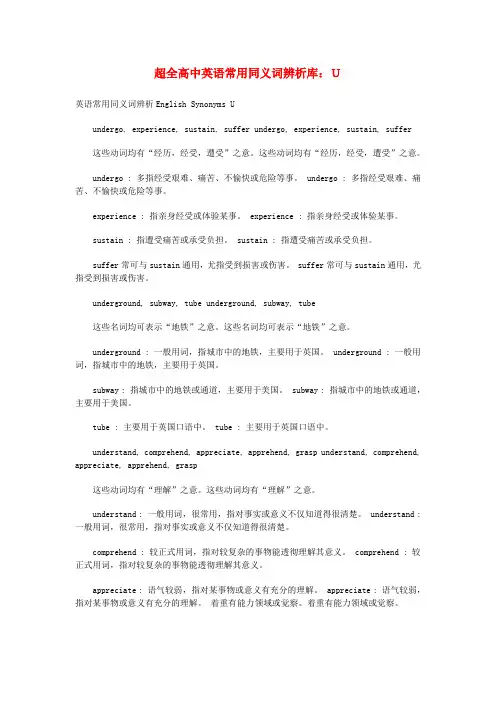
超全高中英语常用同义词辨析库:U英语常用同义词辨析English Synonyms Uundergo, experience, sustain, suffer undergo, experience, sustain, suffer这些动词均有“经历,经受,遭受”之意。
这些动词均有“经历,经受,遭受”之意。
undergo : 多指经受艰难、痛苦、不愉快或危险等事。
undergo : 多指经受艰难、痛苦、不愉快或危险等事。
experience : 指亲身经受或体验某事。
experience : 指亲身经受或体验某事。
sustain : 指遭受痛苦或承受负担。
sustain : 指遭受痛苦或承受负担。
suffer常可与sustain通用,尤指受到损害或伤害。
suffer常可与sustain通用,尤指受到损害或伤害。
underground, subway, tube underground, subway, tube这些名词均可表示“地铁”之意。
这些名词均可表示“地铁”之意。
underground : 一般用词,指城市中的地铁,主要用于英国。
underground : 一般用词,指城市中的地铁,主要用于英国。
subway : 指城市中的地铁或通道,主要用于美国。
subway : 指城市中的地铁或通道,主要用于美国。
tube : 主要用于英国口语中。
tube : 主要用于英国口语中。
understand, comprehend, appreciate, apprehend, grasp understand, comprehend, appreciate, apprehend, grasp这些动词均有“理解”之意。
这些动词均有“理解”之意。
understand : 一般用词,很常用,指对事实或意义不仅知道得很清楚。
understand : 一般用词,很常用,指对事实或意义不仅知道得很清楚。
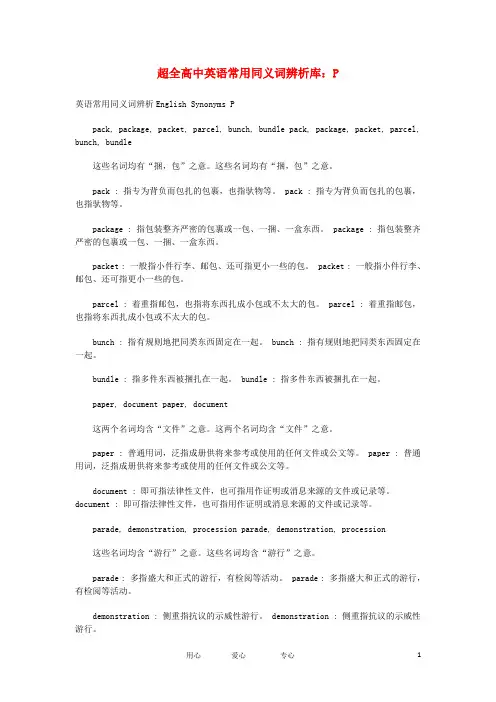
超全高中英语常用同义词辨析库:P英语常用同义词辨析English Synonyms Ppack, package, packet, parcel, bunch, bundle pack, package, packet, parcel, bunch, bundle这些名词均有“捆,包”之意。
这些名词均有“捆,包”之意。
pack : 指专为背负而包扎的包裹,也指驮物等。
pack : 指专为背负而包扎的包裹,也指驮物等。
package : 指包装整齐严密的包裹或一包、一捆、一盒东西。
package : 指包装整齐严密的包裹或一包、一捆、一盒东西。
packet : 一般指小件行李、邮包、还可指更小一些的包。
packet : 一般指小件行李、邮包、还可指更小一些的包。
parcel : 着重指邮包,也指将东西扎成小包或不太大的包。
parcel : 着重指邮包,也指将东西扎成小包或不太大的包。
bunch : 指有规则地把同类东西固定在一起。
bunch : 指有规则地把同类东西固定在一起。
bundle : 指多件东西被捆扎在一起。
bundle : 指多件东西被捆扎在一起。
paper, document paper, document这两个名词均含“文件”之意。
这两个名词均含“文件”之意。
paper : 普通用词,泛指成册供将来参考或使用的任何文件或公文等。
paper : 普通用词,泛指成册供将来参考或使用的任何文件或公文等。
document : 即可指法律性文件,也可指用作证明或消息来源的文件或记录等。
document : 即可指法律性文件,也可指用作证明或消息来源的文件或记录等。
parade, demonstration, procession parade, demonstration, procession这些名词均含“游行”之意。
这些名词均含“游行”之意。
parade : 多指盛大和正式的游行,有检阅等活动。
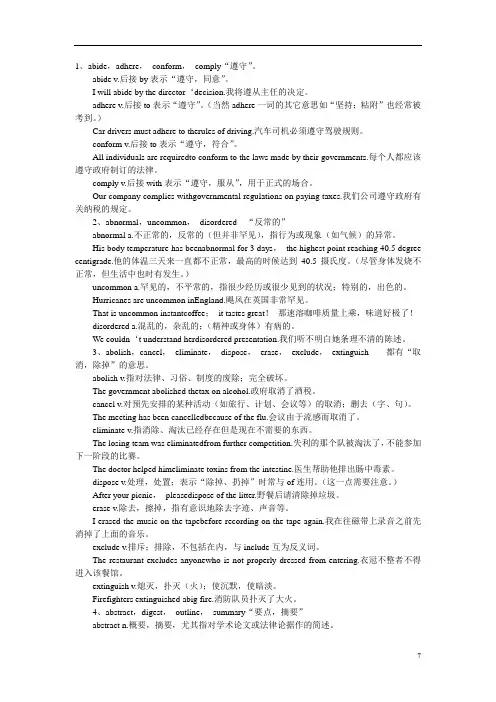
1、abide,adhere,conform,comply“遵守”。
abide v.后接by表示“遵守,同意”。
I will abide by the director‘decision.我将遵从主任的决定。
adhere v.后接to表示“遵守”。
(当然adhere一词的其它意思如“坚持;粘附”也经常被考到。
)Car drivers must adhere to therules of driving.汽车司机必须遵守驾驶规则。
conform v.后接to表示“遵守,符合”。
All individuals are requiredto conform to the laws made by their governments.每个人都应该遵守政府制订的法律。
comply v.后接with表示“遵守,服从”,用于正式的场合。
Our company complies withgovernmental regulations on paying taxes.我们公司遵守政府有关纳税的规定。
2、abnormal,uncommon,disordered“反常的”abnormal a.不正常的,反常的(但并非罕见),指行为或现象(如气候)的异常。
His body temperature has beenabnormal for 3 days,the highest point reaching 40.5 degree centigrade.他的体温三天来一直都不正常,最高的时候达到40.5摄氏度。
(尽管身体发烧不正常,但生活中也时有发生。
)uncommon a.罕见的,不平常的,指很少经历或很少见到的状况;特别的,出色的。
Hurricanes are uncommon inEngland.飓风在英国非常罕见。
That is uncommon instantcoffee;it tastes great!那速溶咖啡质量上乘,味道好极了!disordered a.混乱的,杂乱的;(精神或身体)有病的。
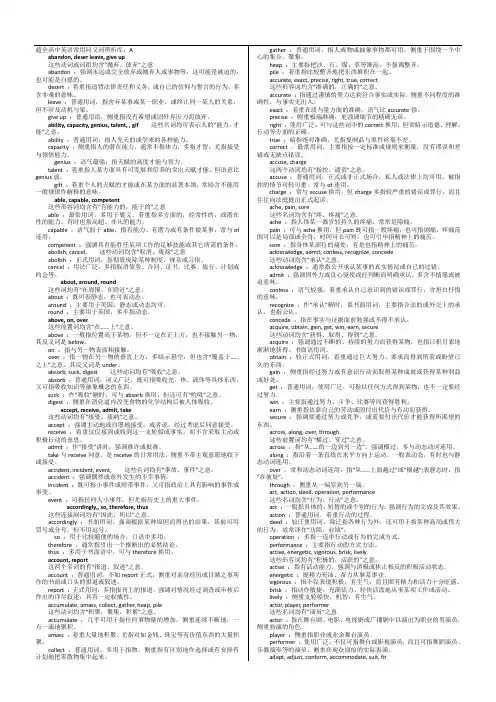
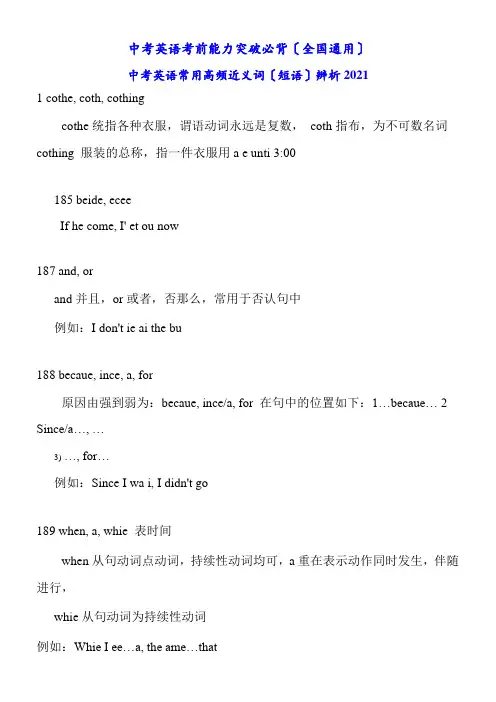
中考英语考前能力突破必背〔全国通用〕中考英语常用高频近义词〔短语〕辨析20211 cothe, coth, cothingcothe统指各种衣服,谓语动词永远是复数,coth指布,为不可数名词cothing 服装的总称,指一件衣服用a e unti 3:00185 beide, eceeIf he come, I' et ou now187 and, orand并且,or或者,否那么,常用于否认句中例如:I don't ie ai the bu188 becaue, ince, a, for原因由强到弱为:becaue, ince/a, for 在句中的位置如下:1...becaue (2)Since/a…, …3)…, for…例如:Since I wa i, I didn't go189 when, a, whie 表时间when从句动词点动词,持续性动词均可,a重在表示动作同时发生,伴随进行,whie从句动词为持续性动词例如:Whie I ee…a, the ame…thatthe ame…a和…一样的〔相似但不同一〕,the ame…that同一物体例如:Thi i the ame193 becaue, becaue ofbecaue连词,连接两句话,becaue of介词短语,后接词或短语例如:He didn't go to choo becaue of hi ine194 in order that, in order to表目的,in order that后接句子,in order to后接动词原形例如:I got uerican citie, uch a New Yor, Atanta and Chicago196 ued to, woud表过去常常,和现在相对应用ued to,不提现在用woud例如:I ued to get uan, much, itte, few修饰用o…that,不用uch that 例如:o man e---Ye, I wi。

3.高中常用同义词辨析汇总高中常用同义词辨析汇总19. average/common/ordinary/general/usual用来修饰人,表示对某一事物的满意,只用作表语。
用来修饰事物,侧重于性质、状态方面的描述。
70. examine/check/test/inspect106. only if/if only高考英语易混易错词汇总结1.clothes, cloth, clothing:clothes统指各种衣服,谓语动词永远是复数,cloth指布,为不可数名词clothing 服装的总称,指一件衣服用a piece of, an article of2. incident, accident:incident指小事件, accident指不幸的事故He was killed in the accident.3. amount, number:amount后接不可数名词,number后接可数名词a number of students4. family, house, home:home 家,包括住处和家人,house房子,住宅,family家庭成员. My family is a happy one.5. sound, voice, noise:sound自然界各种各样的声音,voice人的嗓音,noise噪音I hate the loud noise outside.6. photo, picture, drawing:photo用照相机拍摄的照片,picture可指相片,图片,电影片,drawing画的画7. vocabulary, word:vocabulary词汇,一个人拥有的单词量,word具体的单词He has a large vocabulary.8. population, people:population人口,人数,people具体的人China has a large population.9. weather, climate:weather一天内具体的天气状况,climate 长期的气候状况The climate here is not good for you.10. road, street, path, way:road具体的公路,马路,street街道,path小路,小径,way道路,途径take this road; in the street, show me the way to the museum.11. course, subject:course课程(可包括多门科目),subject 科目(具体的学科)a summer course12. custom, habit:custom传统风俗,习俗,也可指生活习惯,后接to do,habit生活习惯,习惯成自然,后接of doing. I've got the habit of drinking a lot.13. cause, reason:cause 指造成某一事实或现象的直接原因,后接of sth./doing sth,reason用来解释某种现象或结果的理由,后接for sth./doing sth. the reason for being late14.exercise运动,锻炼(不可数),exercises练习(可数),practice(反复做的)练习Practice makes perfect.15. class, lesson:作"课"解时,两者可以替换.指课文用lesson. 指班级或全体学生用class. lesson 6; class 516. speech, talk, lecture:speech指在公共场所所做的经过准备的较正式的演说,talk日常生活中的一般的谈话,讲话,lecture学术性的演讲,讲课a series of lecture on…17. officer, official:officer部队的军官,official政府官员an army officer18. work, job:二者均指工作。
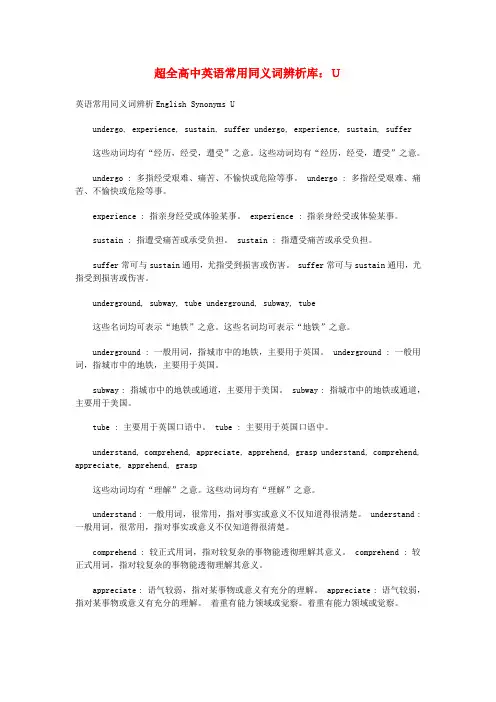
超全高中英语常用同义词辨析库:U英语常用同义词辨析English Synonyms Uundergo, experience, sustain, suffer undergo, experience, sustain, suffer这些动词均有“经历,经受,遭受”之意。
这些动词均有“经历,经受,遭受”之意。
undergo : 多指经受艰难、痛苦、不愉快或危险等事。
undergo : 多指经受艰难、痛苦、不愉快或危险等事。
experience : 指亲身经受或体验某事。
experience : 指亲身经受或体验某事。
sustain : 指遭受痛苦或承受负担。
sustain : 指遭受痛苦或承受负担。
suffer常可与sustain通用,尤指受到损害或伤害。
suffer常可与sustain通用,尤指受到损害或伤害。
underground, subway, tube underground, subway, tube这些名词均可表示“地铁”之意。
这些名词均可表示“地铁”之意。
underground : 一般用词,指城市中的地铁,主要用于英国。
underground : 一般用词,指城市中的地铁,主要用于英国。
subway : 指城市中的地铁或通道,主要用于美国。
subway : 指城市中的地铁或通道,主要用于美国。
tube : 主要用于英国口语中。
tube : 主要用于英国口语中。
understand, comprehend, appreciate, apprehend, grasp understand, comprehend, appreciate, apprehend, grasp这些动词均有“理解”之意。
这些动词均有“理解”之意。
understand : 一般用词,很常用,指对事实或意义不仅知道得很清楚。
understand : 一般用词,很常用,指对事实或意义不仅知道得很清楚。
高中中学英语语法:英语近义词辨析近义词---Vocal, Oral, Spoken, Colloquial
Vocal(adj.)---“发声的”。
指拥有发音的能力。
Verbal(adj.)---“言辞的”。
正式用语。
指笔头表达。
非正式英语中也表示口头表达。
Oral(adj.)---“白话的”。
指口头表达和交流。
Spoken(adj.)---“白话的”。
指口头表达和交流,此时与oral 一词无区别,
但spoken可以构成复合形容词,表示以一种特定方式讲话。
Colloquial(adj.)---“白话的”。
指普通的、非正式的通俗语言。
例:The snake is not a vocal creature.
蛇不是发声动物。
He was very vocal in his objections.
在反对时他嗓门很大。
Let's have oral practice.
让我们作口头练习。
You had an oral examination, didn't you?
你考了口试,是吗?
This word is used in spoken language.
这个词用于白话。
She is a soft-spoken woman.
她是一个说话柔和的女人。
This is a colloquial expression.
这是通俗用语。
He studies English colloquial style.
他研究白话体的英语。
近义词---View, Scenery, Scene, Sight
View(n.)---“景色”。
普遍用语。
指目中所望见的景色。
Scenery(n.)---“景色”,“外景”。
指一个地方乃至一个国家的整个外景或外貌。
Scene(n.)---“景色”。
可与view通用,但多包括了其中的人及其活动。
Sight(n.)---“光景”。
多指人工的事物,比如大建筑史迹等有名的处所。
例:There is a fine view of the mountain from our hotel window.
从我们旅馆的窗口可以看到秀丽的山景。
It was our first view of the ocean.
这是我们第一次看见海洋。
The scenery of this country is unparalleled.
这个国家的风景无与伦比。
The train moved slowly south through flat, drab mainline
scenery.
火车穿过干线两侧风景单调乏味的地区,缓缓地向南驶去。
The boats in the harbour make a beautiful scene.
港中的船只构成美丽的景色。
The scene of sunset was very beautiful.
日落的景色是非常美的。
We will go and see the sights of New York.
我们要去看看纽约的名胜。
The Imperial Palace is one of the sights of China.
故宫是中国名胜之一。
高中中学英语语法-高中中学英语语法重点难点回忆之三
高中中学英语语法重点难点回忆之三
little,no,some, 等修饰。
I have read all the book (that) you gave me.
4)先行词被 the only, the very, the same, the last 修饰时。
He is the only person that I want to talk to.
5)先行词既有人又有物时。
They talked of things and persons that they remembered in the school.
先行词是表示地点时,要根据从句的谓语动词是及物的还是不及物的。
假如是及物的就用that(which),否则用where。
This is the house where he lived last year.
This is the house that (which) he visited last year.
用no sooner…than和hardly…when引导的从句表示“刚……就……”。
主句中的动词一般用过去完成时,从句用过去时;而且主句一般倒装,把助动词had提到前面。
例如:Hardly had I entered the room when I heard a loud noise.
代词作主语时,主谓语序不变。
Here it is. Here he comes.
当句首状语为表示地点的介词词组时也常常引起全部倒装。
South of the city lies a big steel factory.
From the valley came a frightening sound.
表语置于句首时,倒装构造为“表语+连系动词+主语”。
Present at the meeting were Professor White,Professor Smith and many other guests.
Gone are the days when they could do what they liked to the Chinese people.
Among the goods are Christmas trees, flowers, candles and toys.
He has been to Beijing. So have I.
Li Wei can’t answer the question. Neither can I.
部分倒装
用于省略if的虚拟条件状语从句。
Had you reviewed your lessons,you might have passed the examination.
3.用于“形容词(或名词、动词)+as(though)引导的让步状语从句中。
例如:Pretty as she is ,she is not clever.
Try as he would, he might fail again.
假如从句的表语是名词,其名词前不加任何冠词。
Child as he was, he had to make a living.
用于no sooner…than…,hardly…when和not until的句型中。
Not until the teacher came did he finish his homework.
用于never,hardly,seldom,scarcely, barely, little,often,at no time,not only,not once等词开头的句子。
Never shall I do this again.
Little did he know who the woman was.
6.用于以only开头的句子(only修饰副词,介词短语或状语从句时)。
Only this afternoon did I finish the novel.
Only in this way can you master English.
Only when he told me did I realize what trouble he was in.
假如only后面的词组不是状语,则不用倒装。
Only Wang Ling knows this.
用于某些表示祝愿的句子。
May you succeed!祝你成功!
stomach-stomachs,a German-three Germans,
an American-two Americans,man cook - men cooks;
papers 报纸, 文件 manners礼貌 drinks饮料
in a word 简言之?in other words 换句话说
have words with 与某人吵嘴
have a few words (a word) with sb.与某人说几句话The crowd were running for their lives.。